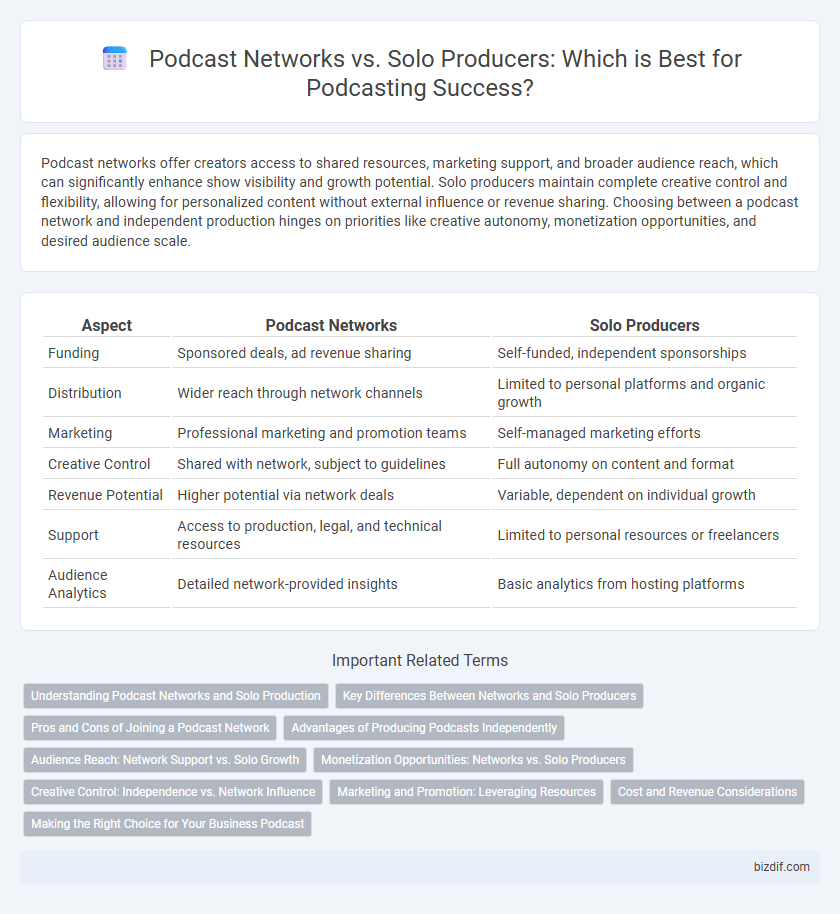Podcast networks offer creators access to shared resources, marketing support, and broader audience reach, which can significantly enhance show visibility and growth potential. Solo producers maintain complete creative control and flexibility, allowing for personalized content without external influence or revenue sharing. Choosing between a podcast network and independent production hinges on priorities like creative autonomy, monetization opportunities, and desired audience scale.
Table of Comparison
| Aspect | Podcast Networks | Solo Producers |
|---|---|---|
| Funding | Sponsored deals, ad revenue sharing | Self-funded, independent sponsorships |
| Distribution | Wider reach through network channels | Limited to personal platforms and organic growth |
| Marketing | Professional marketing and promotion teams | Self-managed marketing efforts |
| Creative Control | Shared with network, subject to guidelines | Full autonomy on content and format |
| Revenue Potential | Higher potential via network deals | Variable, dependent on individual growth |
| Support | Access to production, legal, and technical resources | Limited to personal resources or freelancers |
| Audience Analytics | Detailed network-provided insights | Basic analytics from hosting platforms |
Understanding Podcast Networks and Solo Production
Podcast networks offer structured support, marketing resources, and audience cross-promotion, enabling creators to focus on content while benefiting from collective reach and brand partnerships. Solo producers maintain full creative control and ownership but face challenges in distribution, monetization, and audience growth without the infrastructure provided by networks. Understanding these dynamics helps podcasters decide whether to leverage the collaborative advantages of networks or prioritize autonomy through solo production.
Key Differences Between Networks and Solo Producers
Podcast networks offer collaborative resources, cross-promotion opportunities, and shared distribution channels, enhancing audience reach and production quality. Solo producers maintain full creative control, manage all aspects independently, and often experience greater flexibility but face challenges in scaling and marketing. Key differences include resource availability, audience growth potential, and operational responsibilities.
Pros and Cons of Joining a Podcast Network
Joining a podcast network offers creators access to broader distribution channels, marketing resources, and potential sponsorship deals, which can accelerate audience growth and revenue opportunities. However, joining a network often means sharing ad revenue, less creative control, and potential contractual obligations that may limit content flexibility. Solo producers retain full ownership and creative freedom but must independently manage promotion, sponsorship outreach, and audience engagement, which can slow growth and increase workload.
Advantages of Producing Podcasts Independently
Producing podcasts independently offers complete creative control, allowing solo producers to tailor content without external constraints, ensuring authentic and unique storytelling. Financially, independent podcasters retain full revenue from sponsorships and listener support, maximizing income potential without sharing profits with a network. Flexibility in scheduling and content direction enables solo creators to respond rapidly to audience feedback and evolving trends, fostering closer community engagement and sustained listener loyalty.
Audience Reach: Network Support vs. Solo Growth
Podcast networks provide hosts with built-in audience pools and cross-promotion opportunities, significantly amplifying reach beyond individual efforts. Solo producers rely heavily on organic growth, social media strategies, and consistent content quality to expand their listener base. While networks offer scalability through shared resources and marketing, solo podcasters benefit from greater creative control and direct audience engagement.
Monetization Opportunities: Networks vs. Solo Producers
Podcast networks offer diverse monetization opportunities through pooled advertising revenue, branded sponsorships, and cross-promotion across multiple shows, maximizing audience reach and advertiser appeal. Solo producers face challenges in securing consistent sponsorship deals but benefit from retaining full control over ad placements, merchandise sales, and crowdfunding efforts like Patreon. While networks provide scalable income potential and access to premium advertisers, solo podcasters leverage niche audiences and direct listener support for sustainable revenue streams.
Creative Control: Independence vs. Network Influence
Solo producers maintain full creative control, allowing for complete freedom in content, style, and publishing schedules, which caters to a highly personalized audience experience. Podcast networks often provide resources, marketing, and distribution, but impose guidelines and influence creative decisions to align with their brand and advertising goals. This trade-off between independence and network support significantly impacts the podcast's identity, audience engagement, and revenue opportunities.
Marketing and Promotion: Leveraging Resources
Podcast networks amplify marketing reach by pooling resources, enabling access to professional promotion teams, cross-promotional opportunities, and sponsored ad placements that solo producers often lack. Solo podcasters rely heavily on organic growth strategies, social media engagement, and targeted audience interactions to build a loyal listener base without the financial backing networks provide. Effective promotion in podcasting hinges on leveraging available resources, where networks systematically enhance visibility, while solo creators maximize personalized marketing efforts.
Cost and Revenue Considerations
Podcast networks leverage shared resources and advertising deals to reduce production costs while maximizing revenue through collective audience reach. Solo producers bear all expenses independently but retain full control and 100% of ad revenue, potentially benefiting from niche audience loyalty. Evaluating the trade-off between cost efficiency in networks and revenue autonomy in solo production is essential for podcast monetization strategies.
Making the Right Choice for Your Business Podcast
Choosing between podcast networks and solo production hinges on your business goals, budget, and desired reach. Podcast networks offer extensive distribution channels, marketing support, and access to a built-in audience, which can accelerate growth and brand visibility. Solo producers maintain full creative control and flexibility, often benefiting smaller businesses or niche markets with tailored content strategies.
Podcast Networks vs Solo Producers Infographic

 bizdif.com
bizdif.com